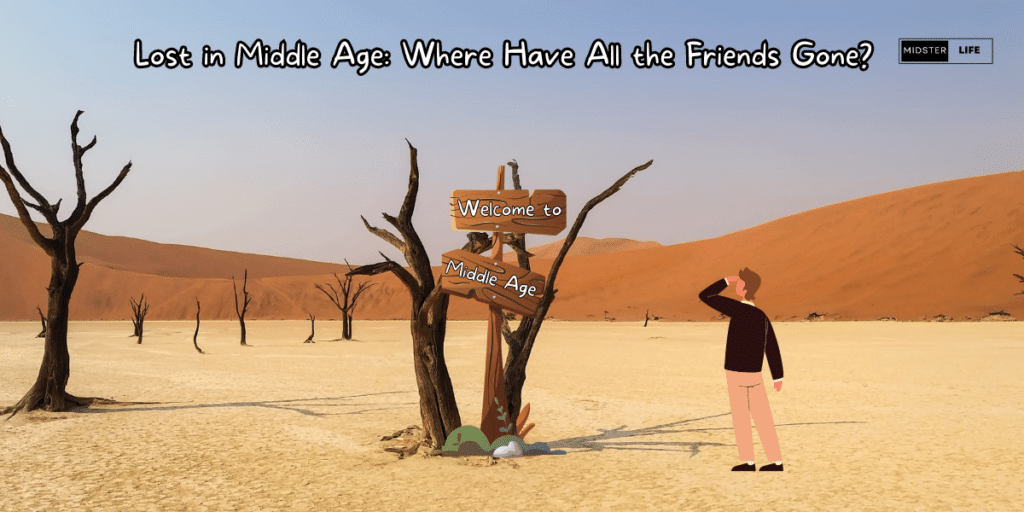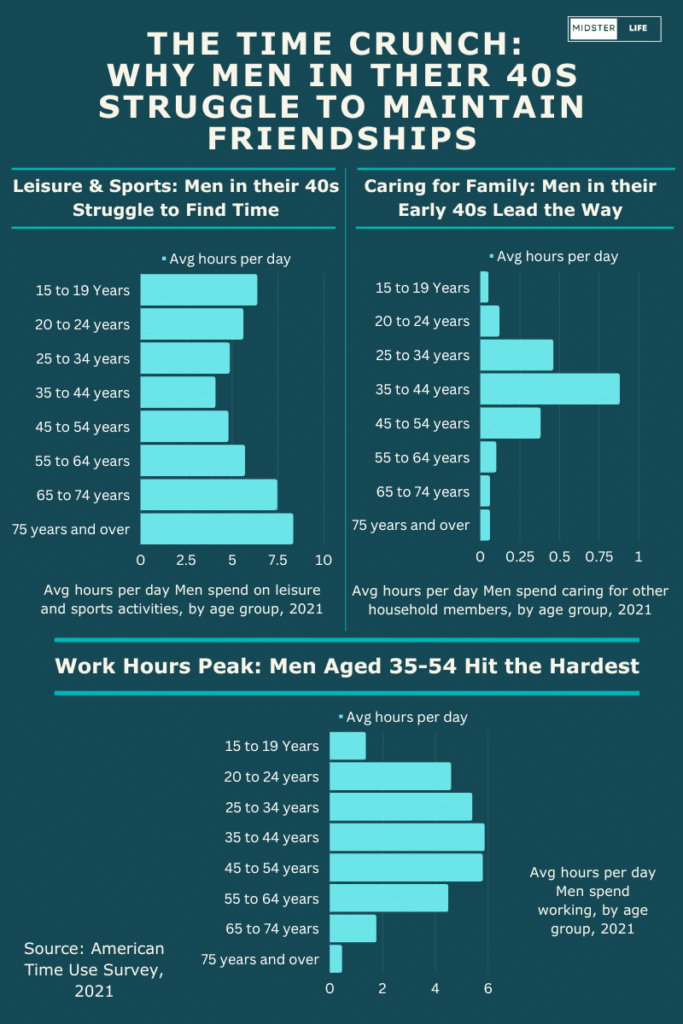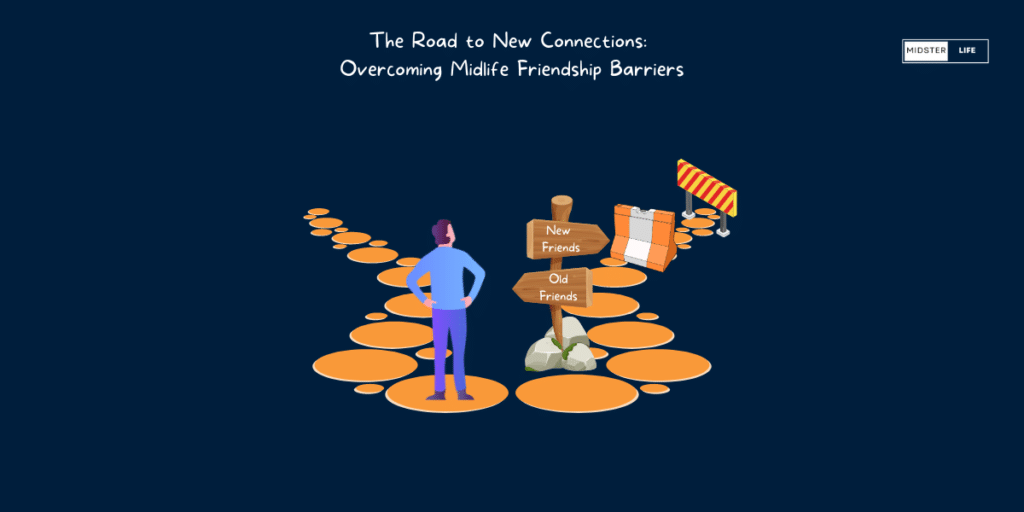Finding New Friends in Your 40s: A Guy’s Guide
It can sometimes feel like a whole new ballgame when it comes to finding new friends in your 40s. With life getting busier and responsibilities such as work and family consuming much of your time, it’s natural that fostering meaningful midlife friendships may become more challenging than in your younger years.
Gone are the days of the carefree 20s, with its seemingly endless carousel of friends and social activities, leaving your 40s feeling a bit lonelier in comparison.
Oh yeah, I’ve felt it.
Back in my 20s, there was never a shortage of people to hang out with, but now in my 40s, I can count my closest buddies on the one hand. While content with this, I also recognize the importance of putting myself out there and remaining open to new opportunities to forge friendships.
So, if your post-40 social life could use a boost, stick with me. I’m here to show you that finding new friends in your 40s is possible and can bring great fulfillment and happiness to your life.
The Importance of Finding New Friends in Your 40s

Building and maintaining friendships is essential for your well-being as you move through your 40s. Strong social connections can have a significant impact on your mental and physical health, as well as your overall happiness.
Combat Loneliness
First, friendships in midlife play a crucial role in combating loneliness, which can negatively affect your emotional and physical health. According to Psychology Today, having a close circle of friends allows you to share life’s enjoyable moments and gain support during challenging times. These connections can help alleviate feelings of isolation and promote better mental health.
Belonging and Purpose
Moreover, friendships contribute to your well-being by providing a sense of belonging and purpose. Having a group of friends with shared interests and values creates a sense of community and encourages personal growth. The Atlantic highlights that adults often connect with others with similar circumstances, such as having children or similar careers, which promotes deeper connections.
Improve Physical Health
Additionally, maintaining strong social connections in your 40s has been shown to improve physical health. According to a study in Gerontology, people with strong social ties typically have better immune function, lower blood pressure, and reduced risk of chronic diseases. Social activities with friends can promote healthier habits, such as regular exercise and healthier eating choices.
Challenges of Finding New Friends in Your 40s

A report from the National Academies of Sciences, Engineering, and Medicine (NASEM) highlights that more than one-third of adults aged 45 and over feel lonely. But although it’s vital to build and maintain friendships in your 40s, it can be challenging.
Several factors can contribute to the challenges of making new buddies as a man in his 40s.
Too Busy For Friends
Firstly, many people in their 40s are busy with work and family commitments, limiting the time and energy available for building new friendships. With a focus on professional growth and raising children, it’s easy to see why you might struggle to find the space in your life for new connections.

Prioritizing time with your partner
Another potential obstacle is being married or in a committed relationship. Your partner may be your primary source of emotional support, which might leave little room for new friendships. Additionally, you and your partner may prioritize spending time with other couples rather than seeking new friends.
Moreover, having children can further complicate social arrangements, particularly when relying on others for childcare assistance. For example, my wife and I must be selective about our social engagements, ensuring that childcare options are available when necessary. Consequently, we often prioritize spending time together over connecting with friends in our broader social circle.
Fear of Being Vulnerable
Vulnerability also plays a significant role in forming deep connections with others. As you age, you may become more hesitant to be vulnerable and open with new people. This can mean that sharing your thoughts, feelings, and experiences may feel riskier than when you were younger.
Narrowing Social Circles
Furthermore, a sociologist would tell you that social circles narrow as people age. You may find it more challenging to make new friends because you are meeting fewer new people than before. Research indicates that during one’s 20s, the focus tends to be on the quantity of friendships, while after turning 30, the emphasis shifts toward the quality of relationships.
Difficulty Finding Like-minded Friends
Finally, connecting with others in your age group can feel daunting since everyone’s circumstances vary. Work, relationships, and life experiences can create significant differences between individuals, and it might be hard to find people with similar values and interests.
In short, making new buddies in your 40s might be challenging due to factors such as time constraints, vulnerability, and limited opportunities for socializing. However, acknowledging these challenges can help you adapt your approach and open doors to new friendships.
Finding New Friends in Your 40s: Tips and Strategies

Despite the challenges of finding new friends in your 40s, you can develop meaningful friendships with the right mindset and approach. Here are a few tips to help you with this process:
- Put in the effort: Building strong connections takes time and effort. Be proactive in contacting acquaintances and showing genuine interest in their lives. If someone stands out in your memory, ask mutual friends to reintroduce you or invite you to coffee or lunch.
- Attend social events and activities: Step out of your comfort zone and attend events and activities that interest you. This allows you to meet like-minded people who share your hobbies and interests. Joining a sports club or a group with shared interests can expose you to new potential friends.
- Practice open-mindedness: Be open to meeting people from diverse backgrounds and belief systems, and strive to build an inclusive social circle.
- Master the art of conversation: Initiating conversations can be uncomfortable, but it’s a necessary step in making friends. Practice making eye contact and exchanging small talk. Work on developing your active listening skills by fully engaging with the person you’re talking to and showing genuine interest in what they have to say.
Here is some additional advice for creating connections:
- Connect with friends-of-friends or acquaintances: Leveraging your existing network can help you meet new people.
- Volunteering for a cause you’re passionate about allows you to connect with fellow volunteers and positively impact your community.
- Try online apps and forums to meet new friends. Embracing technology can help you expand your social circle, especially if you’re looking for people with similar interests.
Remember, friendships are essential for your overall well-being and mental health. So, put yourself out there and invest in cultivating new connections in your 40s.
Cultivating Shared Interests and Hobbies
Finding common ground is essential for building friendships, especially in your 40s when you have limited free time. Pursuing shared interests and hobbies is a great way to connect with others and create strong relationships. Here are some ways to cultivate shared interests and hobbies.
Identify what interests you
First, consider the settings and activities where you might find people with similar interests. Look for local clubs, classes, or meetup groups that focus on topics you enjoy. For example, join a sports league, woodworking class, or hiking group to meet people passionate about the same activities.
Be honest with yourself
Be honest about your interests and be open to exploring new hobbies. Don’t force yourself into activities that don’t genuinely interest you just to make friends. Authenticity is essential for building healthy and long-lasting friendships.
Step outside your comfort zone
Remember that personal growth is crucial at any age, including your 40s. Challenging yourself to learn new skills or step outside your comfort zone can lead to deeper connections with others committed to self-improvement.
Build connections within your existing network
If you have children, engage in family-friendly activities where you can meet other parents. School events, extracurricular activities, and playgroups are excellent ways to connect with other adults and their families.
In addition, you can build on connections you already have within your social network, such as people you’ve interacted with in the past. Staying in touch and engaging with old classmates or co-workers can help you develop closer relationships. Remember to nurture these connections through planned interactions and resilience during life’s ups and downs.
Interests and Hobbies to Consider:
Here’s a list of possible shared interests and hobbies to consider:
- Sports: Whether you enjoy soccer, basketball, or golf, participating in sports will help you bond with others over a shared passion.
- Art or DIY classes: Learning something new together provides a natural environment for conversation and camaraderie.
- Outdoor activities: Hiking, fishing, or nature photography outings can enrich friendships through shared experiences in the great outdoors.
- Book clubs or discussion groups: Stimulating conversations around subjects you care about can foster intellectual connections with others.
Remember to practice active listening when engaging with others around shared interests. Show genuine interest in their perspectives and experiences. This genuine curiosity and engagement will help solidify the connections you form through shared hobbies and interests.
Forums and Social Media Groups
Online platforms offer an excellent way to broaden your social circle after 40. Join social media groups focused on your hobbies or interests, or participate in forums or discussion boards on relevant topics. Take the initiative to engage in conversations and connect with others who share your interests. It’s important to note that while online friendships can have their limits, they can indeed offer genuine social connections, helping fill gaps left by social distance.
Ultimately, the key to building a social circle after 40 is being open to online and offline possibilities. Be proactive in seeking out opportunities, remember to approach others with intent, and let your love for shared interests shine. As you make these connections, remember that maintaining and developing friendships takes time and effort, but the rewards are well worth it.
The Benefits of Finding New Friends in Your 40s

Boost your mental health
Building friendships in your 40s can significantly enhance your life and mental health. As a man in his 40s, developing close friendships allows you to experience affection and intimacy in a supportive, non-judgmental environment. You’ll find great value in having somebody to confide in, especially when grappling with personal challenges or social expectations related to masculinity. Embracing vulnerability and bonding with others can be valuable to personal growth.
Make a wider contribution to society
Nurturing friendships in your 40s will also contribute to society by fostering trust and reducing prejudice. Connections with others from different backgrounds help bridge cultural gaps and promote mutual understanding. By actively nurturing your social life, you can develop empathy and self-awareness, which benefit you and society.
Enhance your happiness and well-being
Moreover, bolstering your friendships can contribute significantly to your happiness and overall well-being. Spending quality time with friends increases your sense of belonging and purpose and can help reduce stress. Not only do strong friendships make life more enjoyable, but they also help you develop self-confidence and self-worth.
So, as a man in your 40s, don’t hesitate to reach out and cultivate meaningful friendships. Strengthening your connections with others will benefit your life, your community, and society as a whole.


